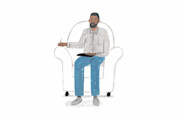Yes, family estrangement is difficult. However, family estrangement and cutting ourselves off from family may be necessary to protect ourselves from dysfunctional family members and their hurtful behavior and ongoing lack of respect for our boundaries.
If you're wondering:
What causes family estrangement?
How long does family estrangement last?
Is it normal to be estranged from family?
How do you deal with family cutting you off?
When should you distances yourself from family?
or
Is family estrangement a trauma?
you're in the right place!
Family estrangement and cutting off family may be necessary to protect ourselves from dysfunctional and hurtful behavior.
It's no secret that family relations can be incredibly challenging.
Since all families are made up of unique individuals, there are different egos and expectations. Additionally, the rules of engagement sometimes feel like they change overnight.
Family conflict and issues are bound to come up.
Sounds exhausting, right?
It definitely can be.
And for some of us, it can be easier—and healthier—to walk away than to stay and fight.
Let's take a look at what family estrangement is, if it's normal to be estranged from family, and how to deal with being cut off from family—whether it was your decision or not.
What is family estrangement?
Broadly speaking, family estrangement is when one family member cuts off and voluntarily and deliberately separates from another family member because of an ongoing, negative relationship.
But it’s more than that.
Most of us who struggle to navigate family conflict have long hoped that our wishes—our boundaries—will one day be respected.
"Family engagement experts" (yes, they do exist!) offer a more comprehensive definition.
Experts say the following must also be present to be considered a true family estrangement:
A complete communication cut-off between relatives; absolutely no contact is made between the estranged parties. (Indirect communication, through lawyers or other family members may happen.)
The communication cut-off is driven intentionally by at least one person.
The estranged relatives could easily pick up a phone or send an email, but do not and have plans to reach out. This means that the cousin you have not spoken to in ten years is not estranged, the author clarifies. He writes “People who have unintentionally fallen out of touch are not estranged.”
At least one of the persons involved asserts something specific about the other person justifies the communication cut-off, like something the other person did, does or failed to do.
That said, family estrangement exists on a spectrum.
Even if you may not check off all of these factors, you may know the pain of a strained relationship with a family member.
In fact, it could be that because you haven’t completely severed ties, the pain of family estrangement can even more intense.

How common is family estrangement?
In his book, Fault lines: Fractured Families and How to Mend Them, author Karl Pillemer tackled this exact question.
Conducting the first large-scale, nationally representative survey on the topic, he found that a staggering 27% of American adults had severed contact with a family member.
That means 67 million people nationwide.
And, given the secrecy and shame surrounding family estrangement, the actual number could even be higher.
Over the course of five years, Pillemer and his colleagues conducted hundreds of interviews with people from all kinds of estrangements: sibling to sibling, adult children and their parents, and various other relationships across the (extended) family system.
The reasons for separation can be so trivial that, after a while, neither party fully recalls what originally sparked the rift.
Bringing these complicated, sensitive family issues to the forefront and talking about their implications is a good thing.
That’s how families heal. But that doesn’t make it any less painful.
That said you'd like to try going to family therapy or counseling together before taking the step of cutting off from family members, the Monarch Directory by SimplePractice can help you find a family therapist near you. Also, you can learn more about the goals of family therapy and how it works.

5 tips for coping with family estrangement
Whether the family estrangement was your decision or not, below are five things you can do to deal with being cut off from your family.
“Blood is thicker than water.”
“Family over everything.”
“Friends come and go, but you’ll always have your family.”
Many of us were brought up to assume that no matter what, no matter how much we didn’t get along with them, our families would always be there for us.
These are some of the “family-friendly” (pun intended) sayings most of us have grown up hearing, and believing, since childhood.
They’re the cliches that may have fed your understanding of the world.
Many of us were brought up to assume that no matter what, no matter how much we didn’t get along with them sometimes, our families would always be there for us.
And then we grew up. And things became increasingly real and complicated.
Here are some ways to deal with family estrangement—whether you're the person making the painful decision to cut off communication with your family or you're an adult parent whose grown child has cut you off.
1. Know your boundaries and stick with them
People often talk about setting boundaries with difficult people. I have one friend who gives her father exactly two hours when she and her family go to her hometown for a visit.
If he’s late, that’s fine. But it cuts into those two hours.
The last time they were there he ended up with exactly 30 minutes to see his grandchild, and when his 30 minutes were up, she and her family were in the car and on their way.
No exceptions. And no added guilt.
Some of the shock over estrangement comes from serial boundary pushers who have continuously crossed the line.

Most of us who struggle to navigate the choppy waters of family conflict have long hoped that our wishes—our boundaries—will one day be magically respected and followed. But at some point, it’s important to become realistic.
It took me many, many years to figure out what my boundaries were, and then it was years after that before I felt confident enough to stand up to my dad and say, “This is not okay.”
But I finally did it. There is pride and power in taking back control and having the confidence not to budge.
2. Own your feelings
The events that lead up to family estrangements are all different.
Some, such as in my case, are the countless ostensibly “small” transgressions that lead to the proverbial last straw.
For others, one particular instance of inappropriate behavior from a family member, results in the decision to part ways for good.
Whatever it is, your truth is your truth, your feelings are your feelings, and they’re never wrong.
It’s important to embrace your feelings about the estrangement and work through them, to feel the sadness, the anguish, the isolation, and acknowledge where those emotions came from.
Without accepting and processing every emotion you’re having about this sensitive situation, it will be impossible to move on.
3. Find a self-care practice and make time for it
When I became estranged from my dad and stepmom two years ago, self-care became incredibly important to help me cope.
When people feel like they’re drifting, they look for routines and activities that will ground them and give them the stillness to make sense of what they’re going through.
These days, you can’t go anywhere on the internet without seeing an article on what self-care is and why it’s important.
When I finally decided to separate myself from my dad and stepmom, I felt lost.
Without a family to point to and say, “that’s mine,” who was I?
Would I be a social pariah?
While developing and prioritizing your own self-care practices and routines can’t bring back the family members you’ve lost to family estrangement, figuring out what "self-care" means for you and slowly implementing some of those behaviors into your daily life can help tremendously to provide grounding, belonging, and even meaning.
And self-care practices can come in many forms such as religion, therapy and counseling, yoga, mindfulness and meditation, reiki, enjoying time outdoors, and preparing healthy and mentally uplifting meals.
Spending time on self-care activities you care about will help you develop something to think about that doesn’t include letting family members take up all of your precious headspace all the time.

4. Recognize your triggers
Our senses are the cornerstone of how we function as human beings, but another great thing they help us with is logging experiences.
For example, when I was growing up, my mom had a huge peony bush right by the side of our front steps.
Every year when they bloomed, it was the first thing I smelled when I walked out the door.
Now, as an adult, when I encounter the scent of peonies, I think of my favorite childhood home.
Sometimes certain smells, tastes, and noises can trigger bad memories, or they remind us of the people and situations we’ve worked so hard to remove from our lives.
Identifying what they are and the negative reaction you might have if confronted will empower you to avoid those triggers, and make better decisions about your health—both mental and physical.
5. Be compassionate and kind to yourself
As a society, we have a tendency toward stress. We’re trying to be teachers and caregivers and soccer coaches and worker bees all at the same time.
Add to that the collective trauma from the COVID-19 global pandemic, and family estrangement and family issues can all feel like just too much to manage.
You may feel on the verge of burning out.
To me, self-compassion meant replacing my negative thoughts and terrible childhood memories with positive words.
During times like these, leaning into the practice of self-compassion is incredibly crucial.
To me, self-compassion meant replacing my negative thoughts and terrible childhood memories with positive words.
Consequently, I started calling old friends that are huge fans of mine, just so I could just talk with them. As a side benefit, listening to them reminded me of my worth. And this helped to improve my self-esteem.
I became kinder to everyone around me, including strangers.
People love to be pleasantly surprised by the kindness of others—and it made me feel good, too. I spent more time being really present with my son and my husband.
Figuring out what self-compassion means for you is key. There are some self-compassion exercises you can try in this article.
How to get support with family estrangement and other issues
You don't have to be diagnosed with a mental illness to benefit from therapy. Many people seek therapy for problems like family estrangement, problems with co-workers, a breakup, or divorce.
If you'd like to try going to family therapy before taking the step of cutting off from family members, the Monarch Directory by SimplePractice can help you find a family therapist.
Or, if you'd like to start therapy or counseling for support and guidance in dealing with the fallout from family estrangement, you can browse therapists and counselors who take insurance—many who offer free initial consultations and are even available nights and weekends—so you can find the perfect fit for your needs.

For therapy to be effective, it's important that you find the right therapist—someone you trust and who has the experience to help you make positive changes in your life.
READ NEXT: The Importance of Self-Esteem—and How to Build Yours
Need to find a therapist near you? Check out the Monarch Directory by SimplePractice to find mental health support and therapists with availability and online booking.
Conti, R. P., & Ryan, W. J. (2013). Defining and measuring estrangement. International Journal of Research in Social Sciences, 3(4), 57-67.
Conti, R. P. (2015). Family estrangement: Establishing a prevalence rate. Journal of Psychology and Behavioral Science, 3(2). https://doi.org/10.15640/jpbs.v3n2a4
Panchal, N., Kamal, R., Orgera, K., Cox, C., Garfield, R., & Hamel, L. (2020). The implications of COVID-19 for mental health and substance use [Issue Brief]. Kaiser Family Foundation (KFF). Retrieved from https://www.kff.org/coronavirus-covid-19/issue-brief/the-implications-of-covid-19-for-mental-health-and-substance-use
Pillemer, K. (2020). Fault lines: Fractured families and how to mend them. Penguin Publishing Group, New York, NY.









